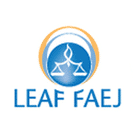LEAF is deeply disappointed in a decision by Stratas JA to deny leave to intervene in the Ishaq appeal. Look here for more information on LEAF’s proposed intervention.
The court released its decision denying leave to all proposed interveners on June 23, 2015. In addition to LEAF, the Canadian Civil Liberties Association, the National Council of Canadian Muslims, the South Asian Legal Clinic of Ontario/the South Asian Bar Association of Toronto, the Ontario Human Rights Commission, and the Barbra Schlifer Commemorative Clinic also sought leave to intervene.
The decision is very worrisome for prospective interveners before the Federal Court of Appeal because it sets out a narrow test for intervention, rejects the validity of relying upon social science evidence not already in the record, and disputes the utility of intervener perspectives.
Stratas JA determined that LEAF and the other potential interveners met all parts of his preferred test for intervention but one; he held that none of the interveners would advance different insights and perspectives from the parties in this case. The narrow test employed by Stratas JA rejects a broad interpretation of the issues in Ishaq, despite the inherently complex and contextual nature of this case with respect to both administrative and constitutional law.
Also problematic is Stratas JA’s assertion that interveners should take on a greater role during fact-finding at the lower courts rather than seek to rely upon social science evidence on appeal. This assertion fails to account for the resource constraints faced by many public interest interveners. Requiring LEAF to take on a significant role at the trial level is unrealistic given the number of cases that require attention across the country, and the resources needed to attend multi-day trials and to submit expert evidence. Further, trial judges may be wary of the potential impact on the parties for interveners to seek to admit evidence at trial.
The implications of Stratas JA’s ruling may be negative and far-reaching for prospective interveners. Despite the disappointing outcome of the leave motion in this case, LEAF’s hope is that the Federal Court of Appeal will undertake a contextual and nuanced analysis of the citizenship oath restriction for niqab-wearing women in Ishaq. The hearing is set for September 15 in Ottawa. LEAF will actively monitor this issue in the coming months.

